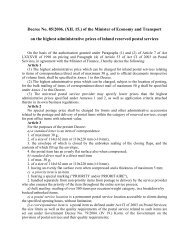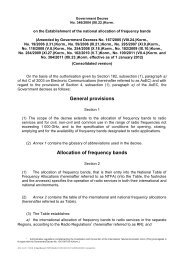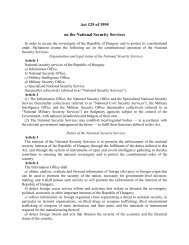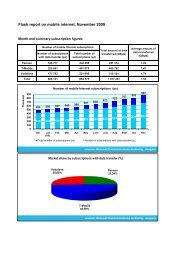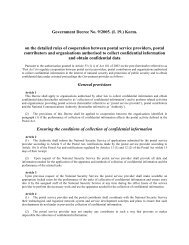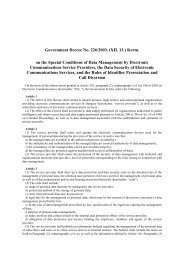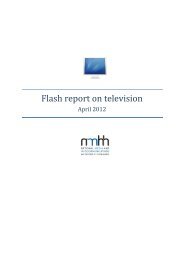The Hungarian Communications Market Developments and ...
The Hungarian Communications Market Developments and ...
The Hungarian Communications Market Developments and ...
Create successful ePaper yourself
Turn your PDF publications into a flip-book with our unique Google optimized e-Paper software.
48 49<br />
gated price index) above the consumer price index (CPI) established<br />
in 2005, all service providers under review violated their obligation.<br />
After the investigation, the Board published a notice that the service<br />
providers should provide a solution with reference to the methods of<br />
eliminating the violations of law <strong>and</strong> disclosed also some desirable<br />
principles to follow. Service providers, in turn, undertook to return<br />
such unreasonable extra revenue to those using residential subscriber<br />
services, within the shortest time, but before the end of 2009<br />
at latest, in the form of increasing service prices at a lower rate than<br />
the consumer price index.<br />
H<strong>and</strong>ling of existing <strong>and</strong> new competition failures in the second<br />
round of market analysis<br />
During the second round of market analysis in the second half<br />
of 2007, the Board made decisions on markets relating to fixed<br />
telephone services. General obligations remained essentially unchanged,<br />
however, their content <strong>and</strong> details were modified according<br />
to professional experiences <strong>and</strong> new market developments.<br />
In addition to its previous decision, the Board identified as new<br />
competition failures in the retail access market, the pre-expiration<br />
withdrawal of subscription packages under fixed term contracts<br />
(loyalty contract) by SMP service providers <strong>and</strong> the obstruction of<br />
changing to a new package by imposing undue requirements that<br />
prevent subscribers from withdrawing from the contract even if the<br />
new one provides a remarkably better alternative offer. Thus, SMP<br />
service providers can obstruct, on the one h<strong>and</strong>, the entry of new<br />
service providers into the market <strong>and</strong>, on the other h<strong>and</strong>, the use of<br />
carrier selection. Subscribers choosing such packages will have an<br />
unreasonable disadvantage as opposed to other subscribers with<br />
subscription packages not requiring long-term commitments.<br />
<strong>The</strong>refore, the Board imposed the prohibition of undue discrimination<br />
of consumers as a new obligation in the retail market of residential<br />
<strong>and</strong> business access. In line with the decision of the Board, the<br />
violation of this obligation can be established if the conditions relating<br />
to the subscription packages are connected to packages to be used<br />
exclusively under a fixed term contract <strong>and</strong> the service provider fails to<br />
ensure this without a loyalty contract, <strong>and</strong> if the conditions are linked<br />
to pre-expiration withdrawal or switching to another package, <strong>and</strong> if<br />
the performance of the conditions by the subscriber is not proportionate<br />
to the service performed until the termination of the contract, or to<br />
the possible expenses or to loss of profit of the service provider.<br />
Results in an international context<br />
Following the European liberalisation of fixed markets at the end of the<br />
20th century, competition first started in traffic markets. In those EU<br />
Member States opening their markets in or before 1998, the market<br />
share of incumbent service providers gradually decreased. At the end<br />
of 2006, the incumbents in several countries owned as low as fifty<br />
percent of the traffic market, with their revenue market share falling to<br />
an average of 64 percent across the EU. On the contrary, Hungary has<br />
seen a very slowly evolving competition in the first three years following<br />
the 2002 liberalisation <strong>and</strong> the loss of share of incumbent service<br />
providers remained below 5 percent even at the end of 2004. After the<br />
publication of the Eht. implementing the new regulatory framework as<br />
well as due to the effects of the renewed regulation reflected in the<br />
decisions of the Board, the process has accelerated over the next<br />
two years, <strong>and</strong> by the end of 2006, alternative service providers could<br />
obtain a share of nearly 28 percent of the entire market.<br />
Figure 4.6: Revenue market share of incumbent service providers<br />
in the entire fixed traffic market<br />
%<br />
100<br />
94,3<br />
90<br />
79<br />
80<br />
72<br />
68,7<br />
70<br />
EU average<br />
65,8<br />
60<br />
64,1<br />
HU<br />
PL<br />
50<br />
SK<br />
SL<br />
CZ<br />
40<br />
2004 2005 2006<br />
Source: NHH <strong>and</strong> EU Implementation Reports 11, 12, 13<br />
Although at the end of 2006, the intensity of the <strong>Hungarian</strong> market<br />
competition was lower than the European average, its dynamics<br />
exceeded it. In two years, the share of <strong>Hungarian</strong> alternative service<br />
providers has increased by 20.3 percent, i.e. more than four times<br />
faster than the EU average.<br />
<strong>The</strong> comparison of the degrees of competition in Hungary <strong>and</strong><br />
in other Eastern European countries reveals a mixed picture. In the<br />
Polish market, the initial value shows a significantly better picture<br />
than in Hungary, however such difference disappeared by 2006. In<br />
the Czech Republic, the two available pieces of data show that the<br />
incumbent market share has decreased to the EU average by the<br />
end of 2006. <strong>The</strong> results of the other two countries are below the<br />
<strong>Hungarian</strong> indices. Slovenian market competition has been evolving<br />
very slowly <strong>and</strong> in Slovakia, competition stopped <strong>and</strong> the share of<br />
incumbent service providers increased in 2006.<br />
We get a similar picture if we investigate the markets of different<br />
call-directions separately. <strong>The</strong> share of <strong>Hungarian</strong> incumbent service<br />
providers in all markets is higher than the EU average. However, the



